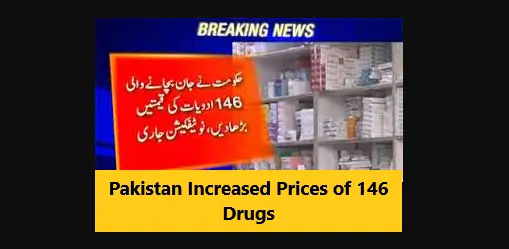Pakistan Increased Prices of 146 Drugs.
Amidst a backdrop of soaring inflation, the federal government has taken the decision to hike the prices of 146 critical life-saving drugs, encompassing medications crucial for treating conditions ranging from cancer to bacterial infections.
This move, announced through an official notification, has stirred discussions across various sectors.
The list of medicines subject to price increases notably includes cancer treatments, vaccines, and antibiotics. While the decision has sparked concerns among healthcare professionals and the general public alike, it reflects the ongoing challenges faced by authorities in balancing the affordability of essential medications with the economic realities of the pharmaceutical industry.
Health officials have revealed that the Drug Regulatory Authority of Pakistan (DRAP) had initially proposed an increase in the prices of 262 drugs. However, the government has chosen to proceed with adjustments for 146 medicines, indicating a selective approach in managing pharmaceutical pricing.
It’s noteworthy that this decision grants pharmaceutical companies the authority to adjust the prices of the identified medications independently. This represents a shift towards deregulating drug prices, providing manufacturers with greater autonomy in pricing strategies.
However, amidst this deregulation, the government has reaffirmed its commitment to maintaining control over the prices of 464 drugs listed in the National Essential Medicines List (NEML). These drugs, deemed vital for public health, will continue to be subject to government oversight to ensure accessibility and affordability for all citizens.
The decision to hike drug prices underscores the complex interplay between healthcare needs, industry dynamics, and economic considerations. While pharmaceutical companies may welcome the opportunity for increased revenue, concerns linger regarding the potential impact on patients, particularly those from marginalized communities.
As stakeholders continue to assess the ramifications of this policy shift, it remains imperative for policymakers to prioritize the well-being of citizens by striking a delicate balance between market dynamics and public health imperatives. Effective regulation, transparency, and stakeholder engagement will be essential in navigating these challenges and ensuring equitable access to life-saving medications for all segments of society.
Note: The information above might not be accepted 100%. Please verify from your own sources. We will not be responsible for any kind of loss due to our content.
For more news, please visit Munafa Marketing.




